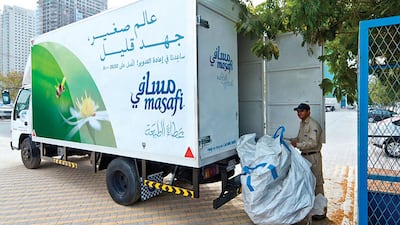ABU DHABI // In a country as hot as the UAE, bottled water probably tops the list of most consumed product. This inevitably produces vast amounts of waste plastic.
Two of the UAE’s most prominent water companies have outlined their commitment to recycling the plastic bottles they produce.
Masafi and Al Ain water said they had schemes in place to keep their plastic use at a responsible level.
But six other local companies – Aquafina, Crystal, Sirma, Romana, Marina and Aquapure – refused to outline details of their recycling operations or indicated that they had none in place.
Masafi has been recycling since 2008 when it incorporated it as part of its “key corporate objectives”.
Aside from promoting recycling internally and through public awareness programmes, Masafi deploys recycling bins for companies and organisations which request one.
“Any UAE school, or any company that is employing 200 plus people, can request the placement of collection bins and hand over plastic bottles for recycling purposes,” said Intikhab Alam, who is head of marketing at Masafi.
Through this service, approximately 100 tonnes of plastic has been collected and sent for pre-processing in Masafi’s plant in Ras Al Khaimah then shipped for recycling in Fujairah where it is reworked into non-food plastic applications.
“In our opinion recycling is everyone’s responsibility,” said Mr Alam.
“We believe it is the responsibility of companies, consumers and governments to work together to propagate recycling as it is important to look after the world we live in.”
Al Ain, another leading water brand, takes a pre-emptive approach to reducing waste.
“We have redesigned the shape of the Al Ain Water bottle and the new lightweight one is more eco-friendly,” a company spokesperson said.
“It uses approximately 30 per cent less Pet [polyethylene terephthalate] and plastic in the bottle and cap, which significantly reduces waste.
“We also maintain partnerships with local recycling companies to ensure that all operational waste, such as Pet, paper, cardboard, and wooden pallets do not enter the waste stream and are reused in some way,” the spokesman said.
Experts have called for stricter laws to be implemented to get companies to recycle.
Habiba Al Marashi of the Emirates Environmental Group, who works on promoting recycling in several businesses – including Masafi, said society as a whole must make more progress in recycling.
“We work with Masafi for obvious reasons, they produce a lot of plastic and we want to make sure that there are proper facilities and sufficient awareness of the importance of recycling,” Ms Al Marashi said.
She said that it is important to make sure that everyone is aware of exactly how to recycle, which begins first and foremost in the separation of plastics from other refuse.
“We all need to be a part of the recycling [effort], that is the way they do it abroad in highly functional recycling societies and that is what we advocate doing here and in the companies,” she said.
There is a tendency in our region to place the responsibility on the government, she said, but that is our failure as a whole society when efficient recycling is not carried out.
“That’s not the correct way to look at it,” she said. “When it comes to the environment it is absolutely everyone’s responsibility to walk the line. Everyone has their role in it.
“Of course the government has something to do with it but in our society we throw the entire responsibility on the government with people saying ‘I will pollute and the government will clean up’ and this should not be the case.”
She said that in order for recycling to be successful, consideration must begin on the side of the consumers and at the moment he or she consumes the last drop in the bottle.
“Then they must start thinking about what happens to this bottle after it is thrown away, where should I take it?
“After that it becomes the infrastructures role to deliver it to be recycled, reused or disposed of,” she said.
nalwasmi@thenational.ae

